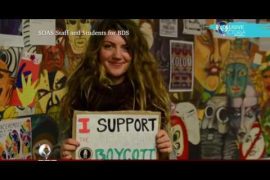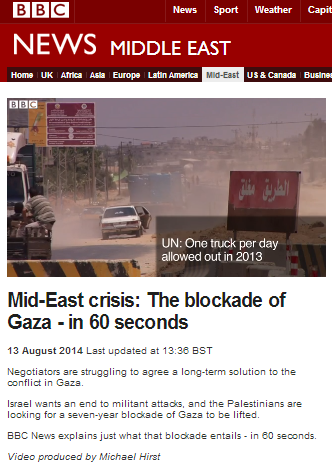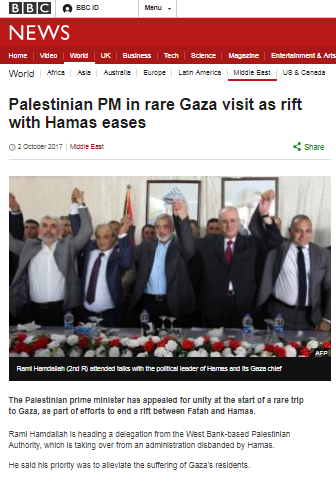BBC audiences have seen plenty of coverage of the ‘gilets jaunes’ protests that began in France in November 2018 and the BBC News website even has a dedicated tab and webpage called “France yellow vest protests” which provides news reports and backgrounders.
Those getting their news from the BBC have however seen no coverage whatsoever of the near-weekly ‘blue glove protests’ which have been going on since mid-October.
“On a sunny, cold morning in mid-December, more than a thousand Palestinians left their workplaces and gathered in a small square adjacent to Palestinian Authority Prime Minister Rami Hamdallah’s office in the West Bank.
The group, largely clad in formal attire, started chanting against the newly established Palestinian Social Security Institution and impending tax hikes required to fund it, as members of the PA security forces stood nearby, blocking the road leading to Hamdallah’s office in central Ramallah.
“The people want the fall of the Social Security Institution,” the demonstrators shouted in unison, while also calling for the ouster of Hamdallah and PA Labor Minister Mamoun Abu Shahala. […]
“Everyone here wants a social security system, but with rampant corruption in our government we cannot trust an institution created by it,” 30-year-old Nidal Quran, a teacher, said on the sidelines of the protest in Ramallah. “What if the government one day takes our money we give to the institution to deal with what it says is a financial crisis?”
An overwhelming majority of Palestinians view PA institutions as corrupt, according to polls conducted by the Palestinian Center for Policy and Survey Research (PCPSR).
The protests against the social security institution have taken place in Ramallah, Hebron, Nablus and other parts of the West Bank, with several Palestinians demonstrating for the first time in their lives.
At the demonstrations, most protesters have worn blue surgical gloves and some have waved blue flags.”
Analysis published by the Washington Institute explains the background to the story:
“The law was created in 2016 by PA president Mahmoud Abbas’s decree, as has been the case with all legislation since the suspension of the Palestinian Legislative Council following Hamas’s 2007 violent takeover of Gaza. It stipulates mandatory contributions by private-sector employers and workers to the Palestinian Social Security Corporation (PSSC): 9% for employers, 7% for employees. Upon reaching age sixty, workers become eligible for a pension.
In light of the dire economic situation in the West Bank, opponents claim the deductions are excessive. They also object to discriminatory provisions in the law, such as one depriving a widow of her deceased husband’s pension if she gains employment, while widowers are not subject to a similar restriction. As for procedure, protestors have decried the lack of consultation during the drafting and enactment of this law since trade unions, private-sector representatives, and civil society organizations were not engaged. They also voice concern that the PA is too unstable and corrupt to reliably manage the funds collected by the PSSC.”
That analysis also explains the significance of the protests.
“…around 61% of West Bankers and 50% of Gaza Strip residents believe they cannot criticize the authority without fear, helping explain their past reluctance to engage in domestic protests.
…the very fact that Palestinians took to the streets to protest, and that these protests were sustained, is a worrying indicator of volatility levels in the West Bank. As already implied, public frustration against the PA can easily shift—or be directed—against Israel. Despite the improved professionalism and effectiveness of the PA security forces, the PA’s eroding political legitimacy complicates the exercise of security control. And in an extreme case, continued lack of legitimacy could even lead to PA collapse, creating a security and political vacuum. Coupled with the tense overall security situation, and with Hamas’s ongoing efforts to foment instability in the West Bank, this could be an explosive mix with impacts not only on the Palestinians but also Israel’s security. The PA’s domestic political woes—as exemplified by the protests against the social security law—are not only a Palestinian problem.”
As has often been observed here in the past, only very occasionally do BBC audiences see stand-alone reports about Palestinian affairs which are not framed within the context of ‘the conflict’ and do not have an Israel-related component.
“Insight into internal Palestinian politics which would enhance audiences’ comprehension of Palestinian society (as well as the conflict) is relatively rare in BBC coverage. Reporting on social and human rights issues within Palestinian society is even more scarce and thus BBC audiences see a blinkered and largely one-dimensional view of Palestinian life.”
That editorial policy continues and so while the BBC has produced dozens of reports on the yellow vest protests in recent weeks, audiences have not seen even one report about the protests in Palestinian Authority controlled towns.
Related Articles:




